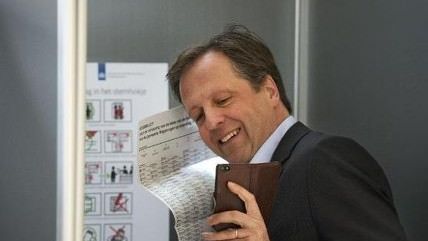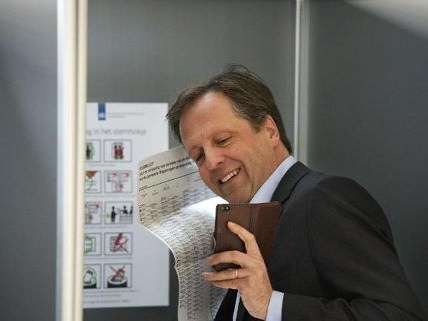A Selfie in the Voting Booth? We've Got a Felony For That


Think twice before you post that grinning voting booth selfie followed by the #turnoutforwhat hashtag, because you may be commiting a felony.
As reported by the Peoria Journal Star, "Section 29-9 of (Illinois') election code essentially says that you can't show other people who you're voting for, even in a photo after the fact." The law has been on the books since 1974, passed by the legislature as a means of stifling "vote-buying" schemes, intimidation, and other forms of tampering. Though local election officials told the Journal Star they had never heard of the law being enforced and the Peoria County State's Attorney said he would be "unlikely" to prosecute a voting booth selfie violator, the code remains a Class 4 felony on the state books.
It's not just Illinois. Dozens of states have restrictions on photographing your ballot. The Digital Media Law Project produced a thorough examination of ballot disclosure laws in 2012, which they described as a "First Amendment Anomaly":
As reflected in our new guide, many states have statutes that prohibit the display of one's own marked ballot to others. A small number of these states only prohibit disclosure of one's ballot in the voting room or prior to submission of the ballot, but most impose a flat prohibition on disclosure backed up by criminal penalties or cancellation of the vote in question. These statutes by their explicit terms appear to ban sharing of a photograph of one's ballot even after the election is over.
Now, we can debate the wisdom of a voter openly declaring the candidate for whom he or she voted. There are sound reasons for a person to keep his or her ultimate selection secret, whether to prevent intimidation at the polling place or retribution by employers or others after the fact. It is easy to imagine situations in which the thoughtless posting of a marked ballot on Facebook could result in negative consequences, as with the posting of so many other ill-advised Facebook photos.
And yet, the First Amendment's protection is at its peak in the realm of speech on political issues. Can a law prohibiting a voter from disclosing his or her own marked ballot be constitutional?
Just this week, the American Civil Liberties Union (ACLU) filed a lawsuit against the "Live Free or Die" state of New Hampshire for updating its existing ban on photographing a marked ballot to specifically prohibit "taking a digital image or photograph of his or her marked ballot and distributing or sharing the image via social media," punishable by up to a $1,000 fine.
Unlike in Illinois, the law is being enforced. According to Boston.com, at least 3 citizens of the Granite State have been investigated by the state's attorney general for posting their ballot to social media, including a police officer who voted for his dead dog as a write-in candidate for the Senate. In an act of defiant rebellion against his own state's law, State Rep. Leon H. Rideout (R-NH), a co-plaintiff in the ACLU's lawsuit, tweeted his marked-up ballot during this past September's Republican primary election "to make a statement." To date, he has not been fined.
So be careful out there today when bragging about fulfilling your civic duty, or at least check the Digital Media Project's helpful guide to see if your state has laws curtailing post-election political speech. As civil liberties lawyer and Reason contributor Harvey Silverglate wrote in his book "Three Felonies a Day," the average American may regularly and unwittingly engage in felonious activity, but he/she will generally not record and publish these petty crimes all over social media.
Editor's Note: As of February 29, 2024, commenting privileges on reason.com posts are limited to Reason Plus subscribers. Past commenters are grandfathered in for a temporary period. Subscribe here to preserve your ability to comment. Your Reason Plus subscription also gives you an ad-free version of reason.com, along with full access to the digital edition and archives of Reason magazine. We request that comments be civil and on-topic. We do not moderate or assume any responsibility for comments, which are owned by the readers who post them. Comments do not represent the views of reason.com or Reason Foundation. We reserve the right to delete any comment and ban commenters for any reason at any time. Comments may only be edited within 5 minutes of posting. Report abuses.
Please to post comments


"There are sound reasons for a person to keep his or her ultimate selection secret, whether to prevent intimidation at the polling place or retribution by employers or others after the fact."
Sure, but why then demand that one's financial contributions to a candidate - a far more serious commitment than a mere vote, and more likely to visit retribution - not be secret too?
It has been proposed that campaign donations all be anonymous. But that's silly, because it would be very easy for someone to prove to the fundraiser that s/he was the donor, while keeping that disclosure from the rest of the world.
Why can't Americans vote the way we conduct ourselves in all other aspects of our lives? In quiet dignity.
If you want to keep your vote anonymous, that obviously OK. But if you want to show people who you voted for, that should be doable too. And I think vote buying/selling should be totally legal.
Can your progtard boss demand all employees send him photos of themselves voting Democrat under threat of being fired if you don't?
He can. And you can quit.
If you live in a state where the voting machine might switch the votes before your very eyes I think it is important to take a video of it with your phone.
Selectively enforced laws are the best laws.
Anyone else hoping this law is used with extreme prejudice on some #GOTV, empty headed nitwit?
Nobody would buy a single vote because it is not decisive and thus worth nothing. The only exception would be if somebody intended to buy tens of thousands of votes, thereby obtaining a significant probability of being decisive.
Actually, those laws exist for sound reasons. People DO coerce or buy votes, and this is a mechanism by which the coercer/purchaser can verify that the person voted 'correctly'.
It may seem trivial and stupid, but it is actually sensible.
"Voter fraud in the 21st century?" Yeah. I'm from Chicago. I was an election judge there. Yes, the vast majority of judges are honest and sincere and everything they seem to be and people want them to be. (including very tired and short of sleep (polls open early, and we have to be there earlier) and confused by the picky rules and regulations because elections don't happen every day)
But not all of them.
I (and the other 4 judges) once closed a polling place with *4* observers from the District Attorney's office watching. We were 'temp' judges because most of the regular judges didn't show up that time. *We* were honest. The guys who didn't show up that day...
I worked one election where every single judge (5/precinct) that day was a) a temp, and b) this was their first election)
Had he shot it?
It was shot by another cop.